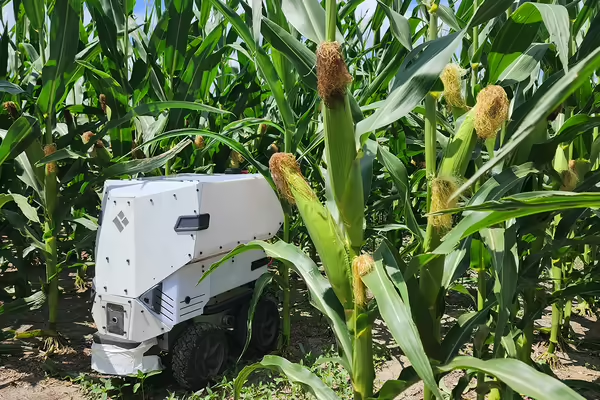
URBANA, Ill. — As the agriculture industry has grown and evolved over the centuries, numerous environmental and societal factors have constantly challenged its resilience. Today is no different. To achieve sustainable agricultural operations, farmers must continue to adopt new technologies and management practices to adapt to present-day factors. Doing this requires exploration, integration, and partnership.
Explore how the integration of technology into farming operations can aid in the adoption of regenerative agriculture practices by attending the Farming for the Future: Digital and Regenerative Ag Integration Field Day from 8:30 a.m. to 1:30 p.m. on Aug. 15 at the University of Illinois Urbana-Champaign Energy Farm in Urbana.
“Through advanced field monitoring coupled with other digital agriculture technologies, such as robotics and drones, researchers are finding ways to help farmers overcome some of the logistical hurdles that can prevent the adoption of practices that improve soil quality and reduce environmental impacts of agricultural operations,” says Talon Becker, commercial agriculture specialist, Illinois Extension.
Field day attendees will learn about the current research coming from the university's Center for Digital Agriculture and Energy Farm, working towards using technology to reduce the environmental impact of agriculture through live field station demos, networking with university researchers and Extension staff, asking questions, and touring multiple facilities.
Topics include cover crops, robotic on-farm systems for crops and livestock, in-field broadband, soil and water quality, air quality and greenhouse gas emissions, and carbon sequestration.
Field day stations include:
- Seeding, monitoring, and intervention with drones.
- Test out the rainfall simulator.
- See live integrations of sensor data.
- Experience the latest technologies for fenceless grazing.
- Plan for various Farm of the Future and Energy Farm tours.
Attending the field day is free, but registration is required by Aug. 12 at go.illinois.edu/RegenTechDay. The event includes light breakfast options and lunch. CPDUs and CEUs are available.
“We’re excited to host this field day to give people the opportunity to see tomorrow’s future in agriculture through today’s technology,” Salah Issa, assistant professor and Extension specialist in the Department of Agricultural and Biological Engineering, part of the College of Agricultural, Consumer and Environmental Sciences. “When combined, technology and regenerative ag practices can get the industry closer to resiliency and sustainability.”
The Farming for the Future Field Day is part of the Illinois I-FARM National Institute of Food and Agriculture, U.S. Department of Agriculture Grant 2021-67021-34418. Additional partners include the university’s Center for Digital Agriculture, National Center for Supercomputing Applications, I-REGEN, and Illinois Extension.
For questions or if you need a reasonable accommodation to participate, please contact Bena Pegg, program coordinator, at cpegg@illinois.edu or 217-333-1106. Early requests are strongly encouraged to allow sufficient time to meet access needs.
SOURCES: Talon Becker, commercial agriculture specialist, Illinois Extension; Salah Issa, assistant professor and Extension specialist, Department of Agricultural and Biological Engineering, College of ACES; Bena Pegg, commercial agriculture program coordinator, Illinois Extension.
WRITER: Jenna Braasch, media communications coordinator, Illinois Extension
Illinois Extension leads public outreach for University of Illinois by translating research into action plans that allow Illinois families, businesses, and community leaders to solve problems, make informed decisions, and adapt to changes and opportunities. Illinois Extension is part of the University of Illinois Urbana-Champaign College of Agricultural, Consumer and Environmental Sciences.